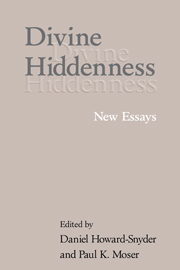Book contents
- Frontmatter
- Contents
- List of Contributors
- Introduction: The Hiddenness of God
- 1 What Is the Problem of the Hiddenness of God?
- 2 What the Hiddenness of God Reveals: A Collaborative Discussion
- 3 Deus Absconditus
- 4 St. John of the Cross and the Necessity of Divine Hiddenness
- 5 Jonathan Edwards and the Hiddenness of God
- 6 Cognitive Idolatry and Divine Hiding
- 7 Divine Hiddenness: What Is the Problem?
- 8 A Kierkegaardian View of Divine Hiddenness
- 9 The Hiddenness of God: A Puzzle or a Real Problem?
- 10 Seeking But Not Believing: Confessions of a Practicing Agnostic
- 11 The Silence of the God Who Speaks
- Bibliography
- Index of Names
- Index of Subjects
5 - Jonathan Edwards and the Hiddenness of God
Published online by Cambridge University Press: 10 November 2009
- Frontmatter
- Contents
- List of Contributors
- Introduction: The Hiddenness of God
- 1 What Is the Problem of the Hiddenness of God?
- 2 What the Hiddenness of God Reveals: A Collaborative Discussion
- 3 Deus Absconditus
- 4 St. John of the Cross and the Necessity of Divine Hiddenness
- 5 Jonathan Edwards and the Hiddenness of God
- 6 Cognitive Idolatry and Divine Hiding
- 7 Divine Hiddenness: What Is the Problem?
- 8 A Kierkegaardian View of Divine Hiddenness
- 9 The Hiddenness of God: A Puzzle or a Real Problem?
- 10 Seeking But Not Believing: Confessions of a Practicing Agnostic
- 11 The Silence of the God Who Speaks
- Bibliography
- Index of Names
- Index of Subjects
Summary
If God exists, why isn't His existence more obvious? Why are God's reality and goodness hidden from not only the careless but from so many sincere and honest inquirers? In an important recent book, John Schellenberg contends that in the absence of satisfactory answers to these questions, we must conclude that God doesn't exist. His argument is this:
“A perfectly loving God would desire a reciprocal personal relationship to obtain between himself and every being capable of it.”
“A logically necessary condition of such a divine-human reciprocity is human belief in divine existence.” Therefore,
If a perfectly loving God existed, He would “ensure that everyone capable of such belief (or at any rate, everyone capable who was not disposed to resist it) was in possession of sufficient evidence to bring it about that such belief was formed.”
“But the evidence actually available is not of this sort.” Hence,
A perfectly loving God doesn't exist.
In what follows we shall see how one Christian philosopher would respond to Schellenberg's argument. Sections I–V examine Jonathan Edwards' views of revelation and human noetic failure. As we shall see, Edwards accepts Schellenberg's first two premises, but denies the third. Evidence sufficient to bring about a belief in God's existence and goodness in everyone capable of such belief and not disposed to resist it is available. It is also intrinsically clear and compelling although sin has blinded us so that we fail to appreciate its force. While these claims are not novel, Edwards' treatment of them is interesting and illuminating. Sections VI and VII will argue that, with some modifications, it is also defensible.
- Type
- Chapter
- Information
- Divine HiddennessNew Essays, pp. 98 - 119Publisher: Cambridge University PressPrint publication year: 2001
- 1
- Cited by



